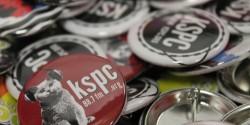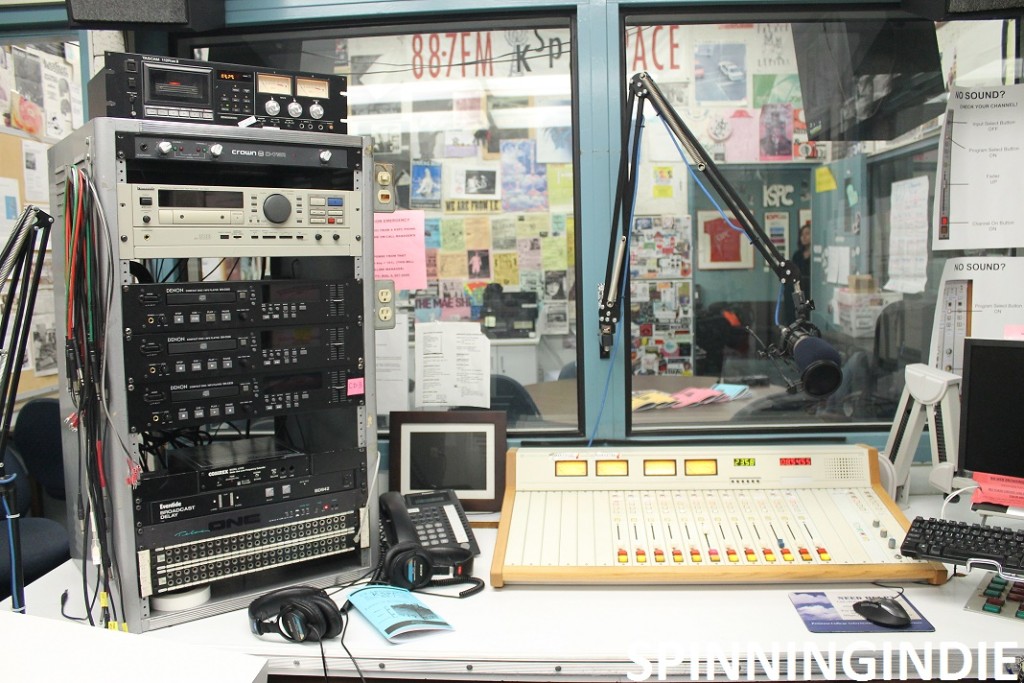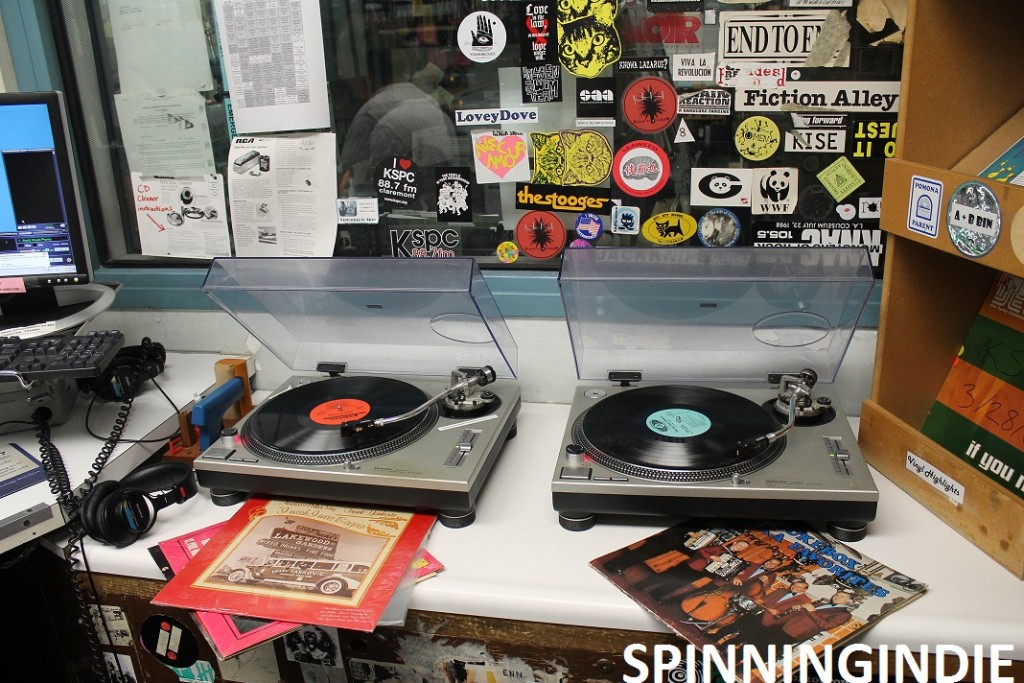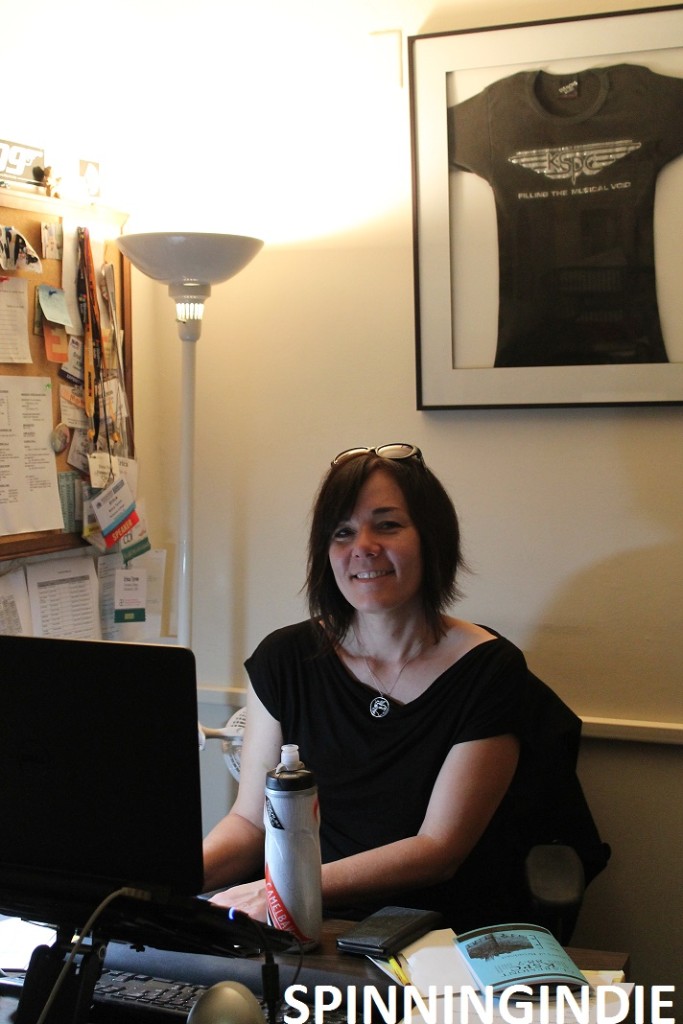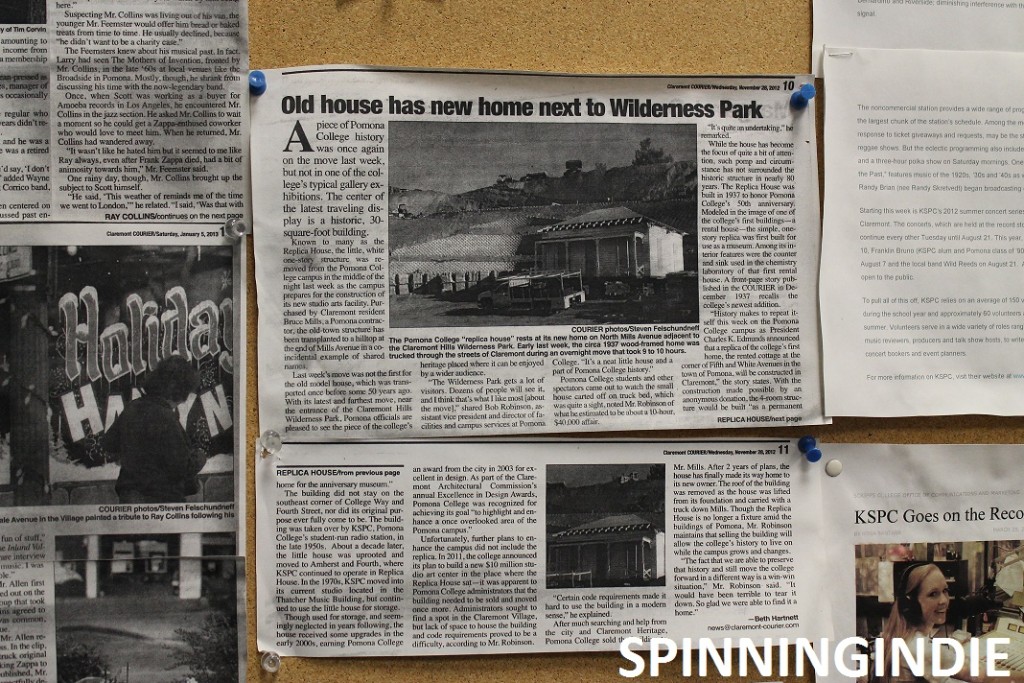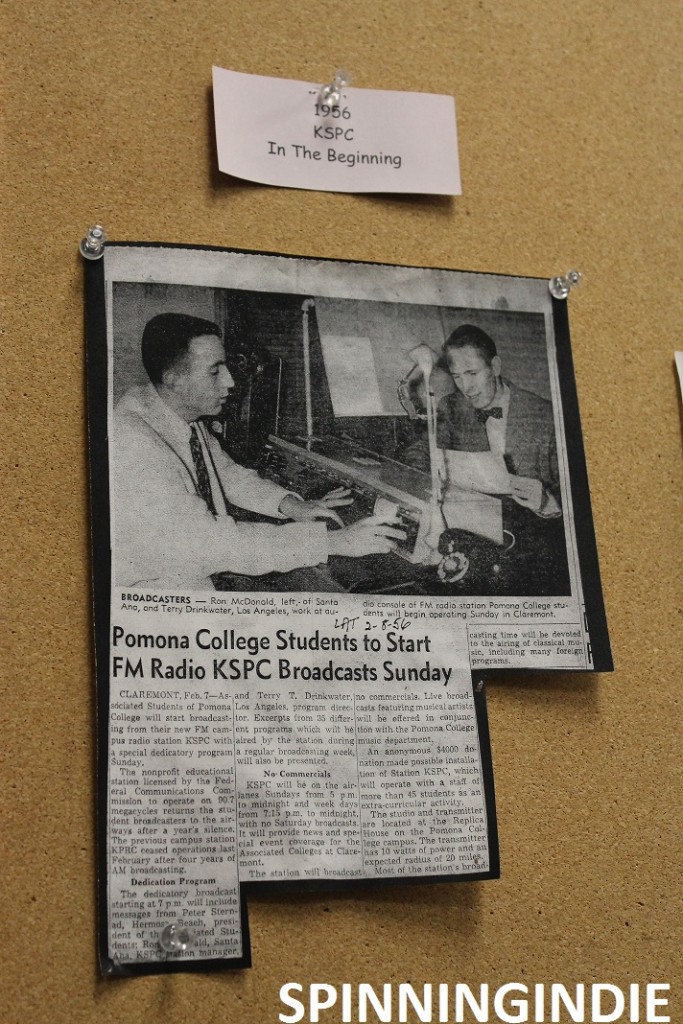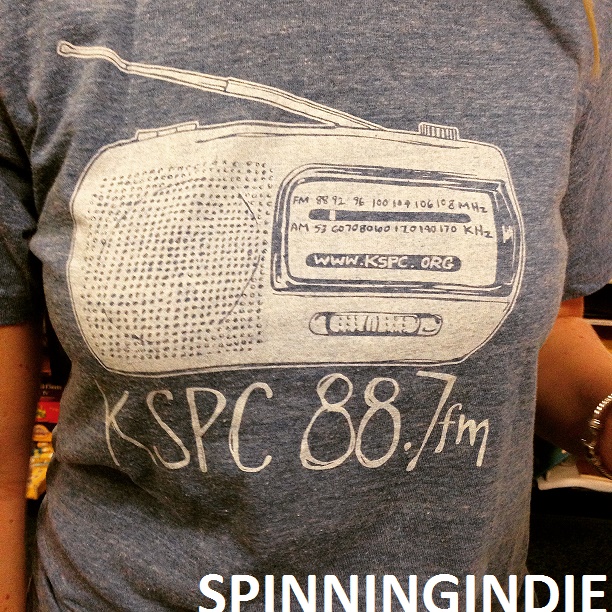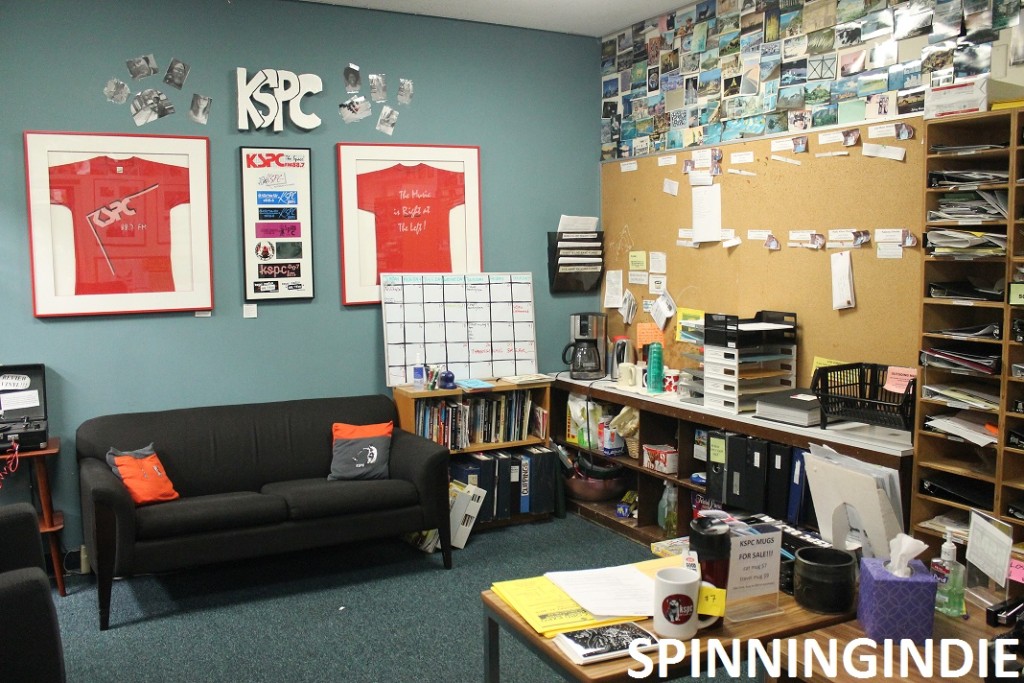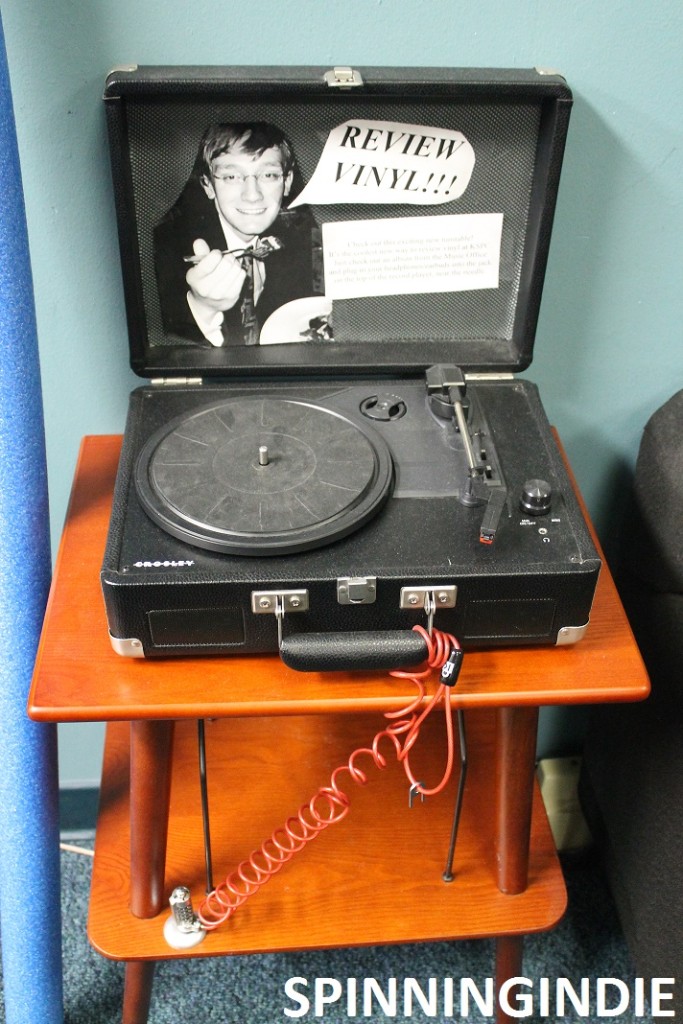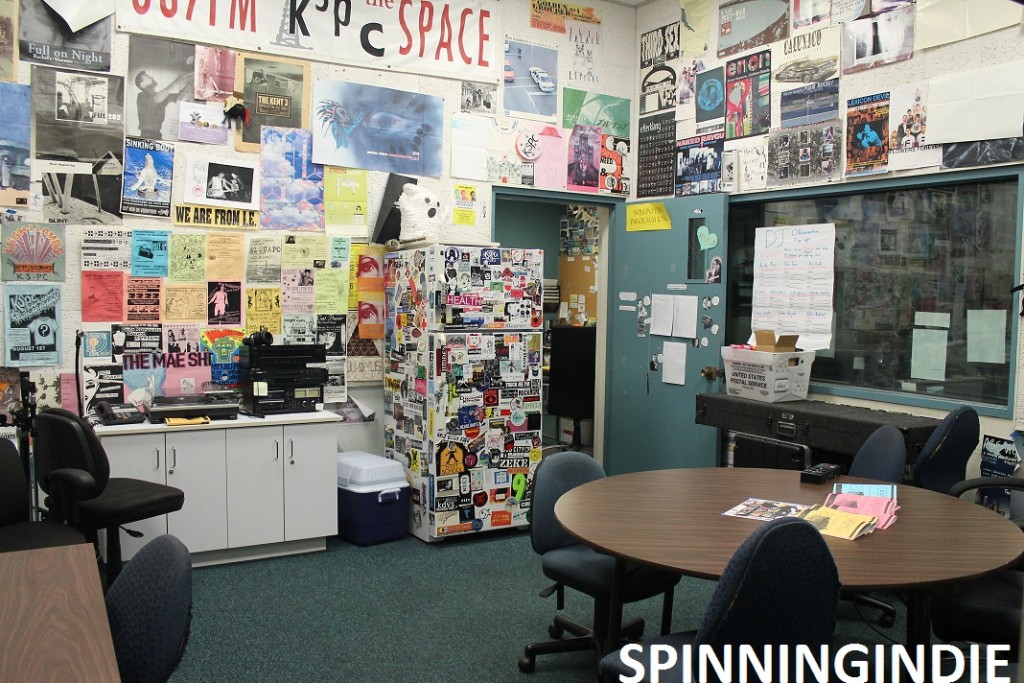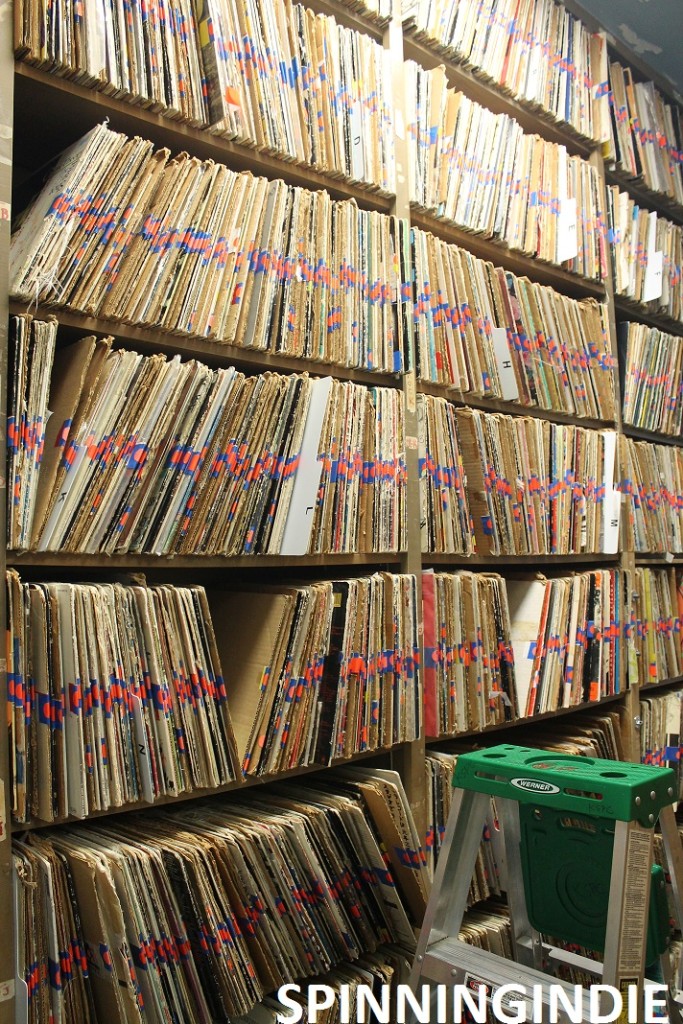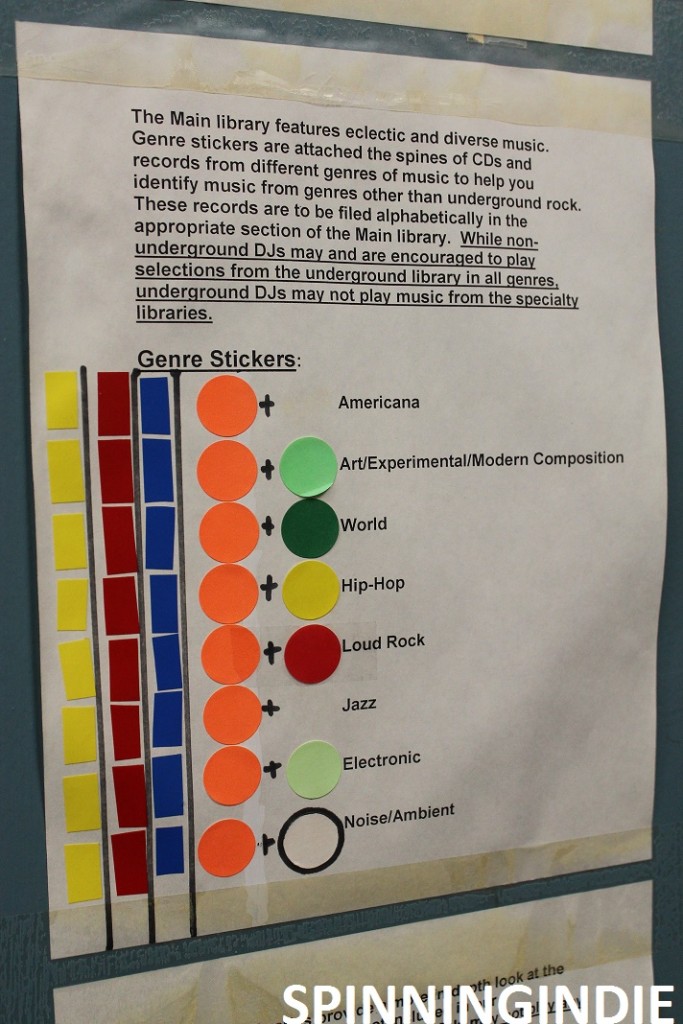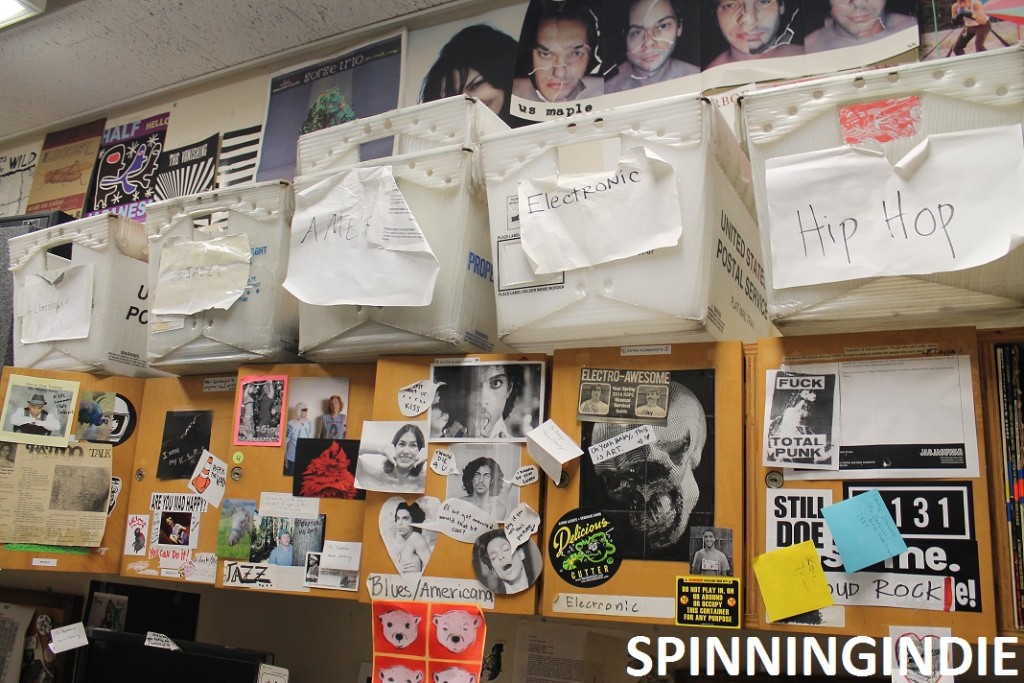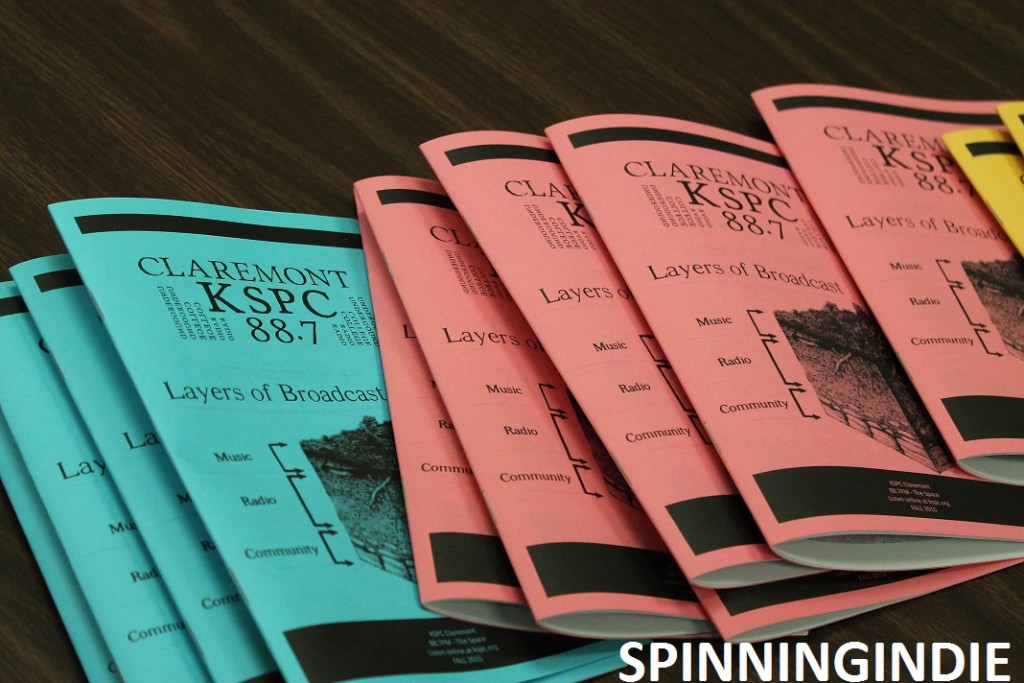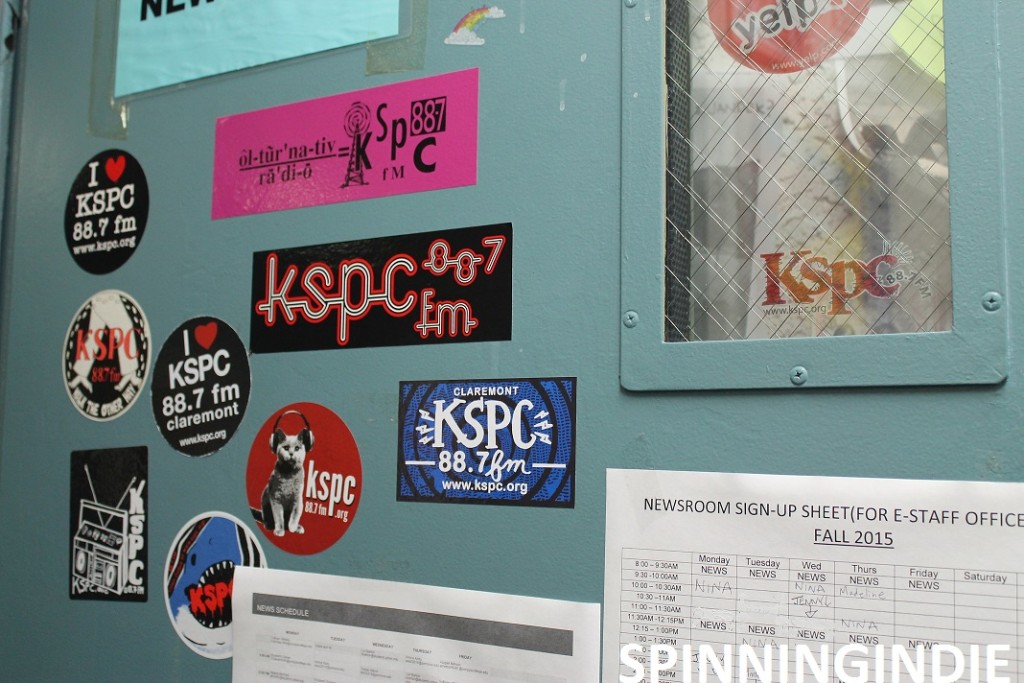While attending the University of California Radio Network (UCRN) conference at Pomona College in Claremont, California last month, I was excited to once again revisit the Pomona College radio station KSPC-FM. I was a volunteer and DJ there during the 1997-1998 school year and it’s always nice to return to the station (I also visited in 2012 for a UCRN conference). Things look largely the same and that always brings back waves of nostalgia for me, as I remember doing my radio shows in the same on-air booth and also clearly remember pre-recording shows (for use during breaks) in the production room.
I arrived at the UCRN conference early in the morning on Saturday, November 14 and scurried through the station taking pictures before all of the attendees arrived. While various KSPC volunteers and Station Director Erica Tyron prepped for the event, community DJ Skip Svoboda was in the studio hosting a polka show, which took me back, as there was a long-running polka show at KSPC during my tenure there too.
I’ve known Tyron since my days at KSPC in the late 1990s, and she’s been an active member of KSPC since she was a student. Over email she described her early days at the station, telling me,
I started at KSPC in the fall of 1988 as a newscaster, and did my first radio show at the end of that semester. I continued to DJ through my senior year at Scripps, and was Publicity Director, Production Director, Summer Music Director and Summer General Manager. I especially loved being Production Director and held that position for a couple of years – I learned how to edit using reel to reels and would happily spend hours in the studio creating promo spots, the concert calendar, IDs, etc.”
After checking out the station on my own and chatting with Tyron, I tagged along on an official station tour and got reacquainted with pertinent details about KSPC. The station has occupied its current location in the basement of the Thatcher Music Building since 1972, although the station dates back to 1956 (it was initially located in Replica House, where the station’s transmitter currently resides). Prior to KSPC there was a campus-only carrier current radio station, KPCR, at Pomona College, which launched in 1951 (learn more about the station’s history here).
KSPC will celebrate its 60th anniversary next year and will also be moving to new digs in the Smith Campus Center basement (which is a short walk away, across a central quad). Tyron shared with me some details about the move and explained that the new location will mean that KSPC will be much more visible to students. She explained,
The motivation for the move at least initially is to make more room available in Thatcher for the Music Department, who really need more space for student music practice rooms. It’s an exciting prospect to be more centrally located on campus than we are now, where it is currently a little difficult to locate our studios – and if you’re not a music student it’s highly unlikely that you’d find out about KSPC by walking by our studios in the basement of Thatcher. The Smith Campus Center is much more heavily trafficked than Thatcher, and we will likely enjoy a lot more interaction with the general campus population by moving to the SCC.”
In light of the forthcoming move, Tyron told me that Alumni Weekend (April 28 to May 1, 2016) will be a good opportunity for KSPC alums to see the current location for one last time. Additionally, during Alumni Weekend, KSPC alumni are traditionally welcomed back on the air at the station. A schedule is already being developed for interested DJs.
Overall, the space (KSPC actually refers to itself as “the Space,” which is a reference to the call letters S-P-C) has a homey college radio feel, with a sticker-covered refrigerator, walls plastered with old flyers, and a cozy couch in the lobby with custom KSPC pillows. KSPC also has the familiar Leo Blais sign hanging on the wall in its lobby.
Although the station is located at Pomona College, these days it receives funding from student governments of the Claremont Colleges (a consortium of five undergraduate colleges, often referred to as the 5Cs, and two graduate schools in Claremont, California that includes Pomona College, Scripps College, Pitzer College, Harvey Mudd College, Claremont McKenna College, Claremont Graduate University, and Keck Graduate Institute).
Students from the Claremont Colleges participate in the station and are given priority for shows over non-student volunteers from the community. The schedule is comprised of music shows as well as talk, public affairs, and news (which airs three times a day). The News Director also oversees a team of podcasters (listen to some KSPC podcasts on the website). Overall, there are around 180 people involved with KSPC during the school year (which includes both DJs and off-air volunteers).
Down the hall from music practice rooms (a piano tuner was about to make his rounds when I arrived), KSPC’s space includes a lobby with a couch, a news room/studio, offices for the Music Director and Station Director, an open room for meetings as well as for live performances (Studio A), a production studio/training room/CD library (called the “PCR”), a vinyl library, and the on-air studio.
The 400 watt station has a broadcast range of around a 35 mile radius and the call letters K-S-P-C originally referred to the phrase “Students of Pomona College,” although today it’s described as “The Space.” Meant to be offering an alternative to programming available on other radio stations, KSPC prides itself on its devotion to underground music and local content. Music shows range from the aforementioned polka show to a long-time reggae program, experimental shows, classical, jazz, blues, metal, big band and video game music programs (to name a few). KSPC also runs a poetry program showcasing local poets. Tyron explained the station’s programming philosophy, saying that,
KSPC’s music staff are committed to supporting independent artists, local artists and good music that’s generally not receiving a lot of attention through major media outlets. In 1956 the station’s founders stated that they wanted to bring a ‘desirable type of programming not readily available in this area’ and we are still trying to do that today.”
As far as music formats, KSPC DJs do their shows using a wide range of media from both the KSPC library and from DJs’ own collections, including vinyl, digital music and CDs. Tyron told me that it often varies by genre, saying,
…we receive more electronic music in digital format than physical media, for example. Some of our specialty show DJs play a lot of vinyl, some are almost exclusively digital, and we still have a large CD and record collection for DJs to play from, although we receive fewer new releases on vinyl these days. For underground, jazz and classical shows we want DJs to play from the KSPC library, and to help build up those libraries by reviewing new releases and helping to fill in gaps by suggesting or donating digital files of artists that we don’t yet have. For more specialized genres we simply don’t have the library available, so most of those DJs are bringing in their own collections (e.g., video game music, polka, 60s/70s rock, 20s/30s/40s jazz and novelty, soundtracks).”
During the UCRN conference, I picked up a copy of the KSPC ‘zine, which had details about KSPC’s Community Feedback Survey, which the station conducted with members of the Claremont Colleges community. According to an article in the ‘zine, “The idea for the survey came after feedback from people both outside and within the KSPC community about the lack of inclusivity, racial diversity, and thus accessibility of KSPC. If KSPC hopes to be a resource, opportunity, and community for everyone at the 5Cs, listening and responding to this feedback is critical.”
The inside front cover of the ‘zine includes a feature, “The Inaccessibility of College Radio and the Music Industry,” which explains the goal of the ‘zine and how it is related to the survey. According to the piece,
This zine is a tool for thinking about how college radio is implicated in systems of power. By systems of power we specifically mean whiteness, though we also touch on how this intersects with patriarchy, classism, and ableism.
It is impossible to discuss college radio without discussing the music industry at large. The ways the music industry has relied on racism and elitism to flourish is an inherited legacy and context that college radios have to contend with, particularly those that draw on alternative or underground music.
Even if you do not have any experience with college radio, or are just a listener, we hope this zine will be an opportunity to reflect on the state of music and student media at large…”
As I discussed on Radio Survivor Podcast #25, the survey brought to light some fascinating tidbits about how students view KSPC. I was impressed that the station undertook a project like that and was willing to share the results, even if the findings aren’t completely flattering. KSPC released the ‘zine during the UCRN conference and in the “Our Thoughts on What We’re Doing Next” article, the staff encouraged other stations to tackle issues about inclusion at their own stations (the findings in KSPC’s survey are certainly not unique to KSPC), writing, “In having these discussions and thinking about community, we’d also like to invite our fellow college radio stations, especially with the timely release of this zine during the University of California Radio Network (UCRN) Conference, to engage in such conversations among your staff or in your community.” Complete results can be seen here.
Thanks to everyone at KSPC for the warm welcome and particular thanks to long-time KSPCer Erica Tyron for filling me in on more details about KSPC. This is my 96th station tour report. Coming up, I have two more tour recaps left from 2015: one from California and one from Oregon. Following that, I get to start plotting out my 2016 tours. Who will be #100? See my most recent field trips on Radio Survivor and see all of my station field trips on Spinning Indie.

